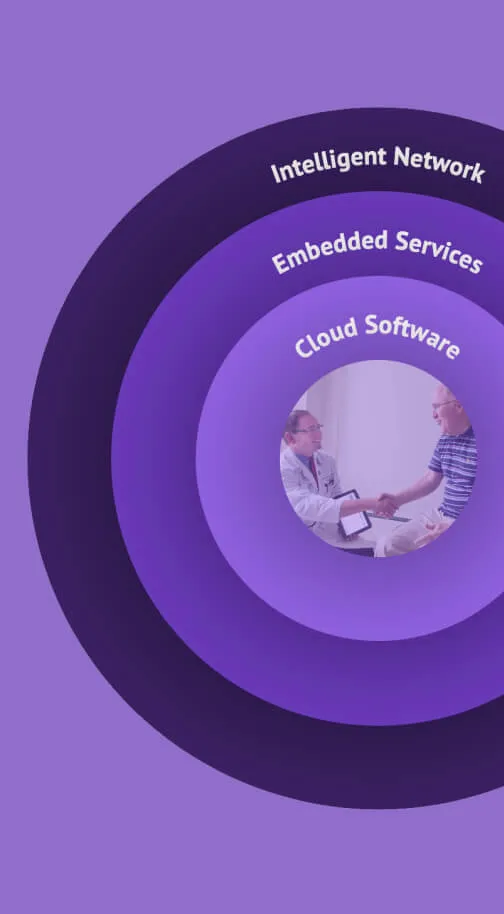See how role-based access and exception-based workflows support practice efficiency
Running an efficient practice is easier to do when each clinician and administrative staff member can focus on the work they do best, with as few distractions as possible. Physicians and clinicians should be able to work at the top of their license, delivering excellent care to improve patient outcomes. Practice managers, receptionists, billers, and other non-clinical staff should be handling those tasks which will have the greatest impact on the health of the practice and its bottom line.
athenaOne®, our fully integrated EHR, practice and revenue cycle management, and patient engagement solution, has built-in capabilities to help each person at your practice take on the right work at the right time. Our technology is designed to reduce inefficiency and help each user move more smoothly through their work at the practice, whether that’s the receptionist collecting payment information, the physician assistant recording vitals, the clinician conducting the exam, or the billing staff working claims.
With role-specific access and exception-based workflows, we’re removing distractions and curing the complexity of delivering care. Ready to take a closer look? We’ll show you just what you need to know.
See what you need to see with role-specific access
athenaOne gives medical practices the flexibility to tailor their users’ experience according to that person’s specific role: physician, medical assistant, care manager, practice manager, receptionist, biller, and so on. The functionalities, tools, and information presented relate directly to their job, and even to the specific department and team members they support. With role-specific access, the practice can make sure the user sees what they need to see — without cluttering their screen.
As the name suggests, an advantage of role-specific access is that it doesn’t tie permissions to individual users, but to their jobs. For instance, if one member of the billing staff is absent on a given day, anyone else with that role’s permissions can access their Workflow Dashboard and keep their work moving forward. If there’s a locum tenens physician covering for another clinician, they can access the information they need, which automatically populates their own Clinical Inbox and calendar. In both cases, the user can select the role they’re taking on so important tasks don’t fall through the cracks.
Recognizing that each practice has unique needs and preferred ways of working, our EHR and practice management software doesn’t lock in user permissions based on our preferences — we leave it up to you. Each practice has the flexibility to tailor user permissions based on the way their staff roles work. User permissions are set up at implementation, and the practice is free to adjust them at will, any time down the line. Account security and access control are handled in compliance with HIPAA regulations.
Here are just a few examples of how a practice might set up role-based permissions in athenaOne. Each practice is empowered to add and subtract accesses to align with the way they prefer to work.
- Check-in staff may have access to patient demographics, insurance eligibility checking, payment collection, and the practice’s schedule.
- Medical assistants may be able to perform patient intake, complete documentation, view the Review of Systems, and tee up procedures, orders, and referrals for the clinician.
- Clinicians have access to the patient’s complete medical history (past, present, future), and can filter the practice’s schedule to see their own patients’ appointments.
- Check-out staff may be able to access scheduling, print educational materials to share, and so forth.
Recognizing that each practice has unique needs and preferred ways of working, athenaOne doesn’t lock in user permissions based on our preferences — we leave it up to you.
Do what you need to do with exception-based workflows
Workflows in athenaOne streamline processes by surfacing tasks that require attention, rather than having users sift through all the available data. This approach helps users manage their workload more efficiently by highlighting exceptions or items that deviate from the norm and need action.
athenaOne’s Clinical Inbox displays tasks that require the clinician’s attention based on their role. It highlights urgent tasks, flags critical lab results, lists cases that need follow-up, and indicates new patient messages from the Patient Portal or the athenaPatient® app.
For front desk staff and billers, athenaOne’s Workflow Dashboard uses exception-based workflows to support focus and reduce information overload. The Workflow Dashboard surfaces patient- and appointment-related tasks such as unverified and ineligible insurance, outstanding payments, cancellations, no-shows, appointments to schedule and reschedule, and so on; as well as claims-based tasks the practice needs to address.
athenaOne handles the lion’s share of claims on behalf of our customers without needing their input. Flagging the exceptions saves time and allows staff members to focus on activities that drive a measurable difference to the bottom line. User permissions in our EHR and practice management software determine which content is visible to any Clinical Inbox or Workflow Dashboard user.
The benefits of role-based personalization in athenaOne
- Enhances clinical efficiency: Medical staff can tee up procedures, orders, and referrals in the EHR software to help the clinician work more efficiently during the patient encounter.
- Supports data privacy and security: Only those roles that need access to patient information will have it. Minimizing access to PHI and PII is a critical component of HIPAA compliance. Role-based permissions help to ensure that practice staff are handling only the amount of data they need to perform their roles.
- Promotes practice efficiency and performance: Helps practice management staff create, submit, and rework cleaner claims more quickly, so it can get paid promptly.
- More efficient patient communications: As more patients access and use online portals and mobile apps to communicate with their physicians, managing those communications has become a growing demand on providers’ time. Role-based access allows the clinician to delegate as many tasks as possible to clinical staff, including responding to routine patient requests in the Clinical Inbox.
Curing complexity by driving efficiency
Enabling role-based access and exception-based workflows are just two of the ways athenaOne works to cure complexity through all aspects of your practice. They’re how we keep tasks off the clinician’s plate and make sure practice management and billing staff are focused on the right work at the right time. They also help with role-based clarity, who’s responsible for what, so the entire practice can run more smoothly.
Interested in boosting efficiency at your practice? Request a demo today. Get to know how our electronic health record and practice management software can help cure the complexity of delivering care.













